CTA’s Tibet Policy Institute, Tibet Museum and ITCO Organises Day-long ‘Thank you India Program’ at O P Jindal Global University

Chief guest Dr C Raj Kumar, Vice Chancellor, O P Jindal Global University inaugurating the photo exhibition, along with Deputy Director of Tibet Policy Institute Mr Sonam Tenzin and Deans of Jindal School of International Affairs, Jindal School of Liberal Arts and Humanities at the O P Jindal Global University on 29 August, 2016. Photo credit: Buchung Dhargyal, TPI
SONIPAT: As a mark of gratitude to the government and people of India, the research wing of the Central Tibet Administration in collaboration with the India Tibet Coordination Office (ITCO) and the Tibet Museum organised a daylong ‘Thank you India’ program at O P Jindal Global University, Sonipat, on 29 August 2016.
The daylong program featured four events, focussed on facilitating dialogue between the new generation of India and Tibet: discussion cum conference hosted jointly by TPI researchers and Indian scholars at Jindal university; a photo exhibition on the life of Tibetan spiritual leader His Holiness the Dalai Lama and India Tibet relations by the Tibet Museum; public talk by distinguished Indian leaders on Tibet’s role in India-China relationship; screening of short films on India-Tibet relationship.
The chief guest of the opening ceremony Prof Dr C Raj Kumar, Vice Chancellor of O P Jindal University, along with the deputy director of Tibet Policy Institute Mr Sonam Tenzing and deans of Jindal School of Liberal Arts and Humanities and Jindal School of International Affairs inaugurated the photo exhibition showcased on ‘the Life of Tibetan Spiritual Leader His Holiness the Dalai Lama’ & ‘India-Tibet Relations.’
Following an elaborate tour of the exhibition, the chief guest along with the scholars and researchers of Jindal University and the Tibet Policy institute kick-started the conference titled ‘Discussing Tibet with Indian researchers’ at the conference room.
In his welcome address, the Vice Chancellor expressed his happiness at being able to host the researchers of Tibet Policy Institute at the university to discuss important issues relating to Tibet and the Tibetan people. He affirmed his commitment to develop many more collaborations with the Tibet Policy Institute in the coming years.
The deputy director of Tibet Policy Institute, Mr Sonam Tenzing underlined the significance of the Thank you India program, which is being organised by Tibetan people in different parts of India. “The Tibetan people and leadership consider it extremely necessary to extend gratitude to the people and government of India for providing assistance for several decades since 1959.” He emphasized that the Thank you India program is an occasion to appreciate the good relationship between India and Tibet, and to inform the Indian population on the current situation inside Tibet controlled by China and the exile life of Tibetans in India and diaspora.
Five researchers of Tibet Policy Institute presented their research papers before the scholars and researchers of Jindal Global University, followed by an effective discussion among the researchers based on the presentations.
Researcher Tempa Gyaltsen, Tibet Policy Institute’s Environment desk, introduced the Tibetan plateau, current environmental situation in Tibet and its global implications and occurrence of natural disasters induced by the excessive damming on Tibetan rivers.
Second speaker Tenzin Tseten, researcher at TPI presented his paper on the formation of Elite Tibetan leadership in Tibet Autonomous Region (TAR) at the regional level and discussed the general streams of power including the propaganda, organisation, military, judiciary and discipline. Researcher Sherab Woeser presented on China’s 13th Five-year plan, the shift in its economic model and areas of focus.
The other two researchers Tenzin Dalha and Tenzin Tsultrim presented on the Chinese censorship versus Tibetan activism on social media and the militarization of Tibetan plateau and its significance.
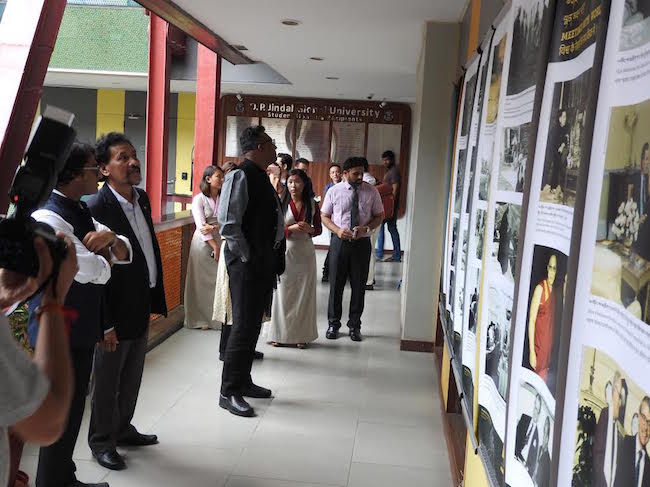
The Vice Chancellor and faculty of O P Jindal University touring the photo exhibition showcased by Tibet Museum on the ‘life of His Holiness the Dalai Lama’ and ‘India-Tibet Relations.’ Photo credit: Buchung Dhargyal, TPI
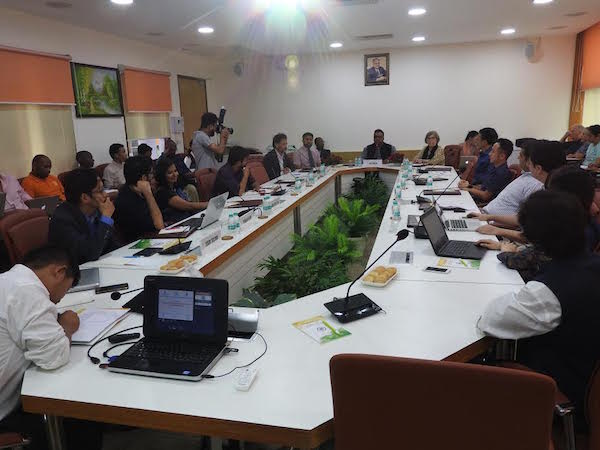
Visiting researcher at Tibet Policy Institute Mr Tenzin Tsultrim presenting his paper on ‘Militarization of the Tibetan Plateau and its significance’ before the scholars and researchers of JGU. Photo credit: Buchung Dhargyal, TPI
Around 15 Indian scholars and professors of the university along with students of International relations and members of ITCO attended the discussion.
The associate professor of Jindal school of International Relations Dr Roger Chi-Feng Liu delivered the vote of thanks and presented mementos to the deputy director Mr Sonam Tenzing and the Tibetan researchers.
In the evening, the India Tibet Coordination Office (ITCO) organised a public talk on ‘Tibet’s role in Sino-India Relations’ at the auditorium, which was attended by around hundred students from the Jindal University and Delhi colleges, professors of Jindal University, local Tibetan community leaders, Tibetan women’s association and members of ITCO.
After observing a minute of silence in solidarity with the self-immolators in Tibet, Mr Jigmey Tsultrim, Coordinator of ITCO, introduced the distinguished speakers and spoke briefly on the vibrant relationship shared by India and Tibet.
The panel of speakers include Mr R K Khrimey, National Convener of Core group for Tibetan Cause-India, Dr Sreeram Chaulia, Dean, Jindal School of International Affairs, Shri Joginder Singh Dahiya, Chairman, Kharkhoda Block Congress, Sonipat and Shri Dharampal Dahiya, Vice Chairman of Sonipat District Congress Committee.
Mr R K Khrimey, National Convener of Core group for Tibetan cause-India, in his address, emphasised the contributions made by His Holiness the Dalai Lama to world religion, peace and non-violence. He conveyed his prayers for the restoration of sovereign identity of Tibetan people in the lifetime of His Holiness the Dalai Lama.
Dr Sreeram Chaulia, Dean, Jindal School of International Affairs stated the significance of Tibet and the resolution of Tibetan issue as a key determinant of India’s national security. He urged all the Indian students to talk and share awareness on the Tibetan issue among their circles.
The other two speakers Shri Joginder Singh Dahiya, Chairman, Kharkhoda Block Congress, Sonipat and Shri Dharampal Dahiya, Vice Chairman, Sonipat District Congress Committee appealed the government of India for positive talk on Tibet with the Chinese leaders. They expressed their solidarity with the Tibetans inside Tibet and pledged to talk Tibet at social political platforms
Mr Sonam Tenzing, Deputy Director of Tibet Policy Institute gave the vote of thanks and presented memento of appreciation to the faculty members of Jindal School of International Affairs and Jindal School of Liberal Arts and Humanities.
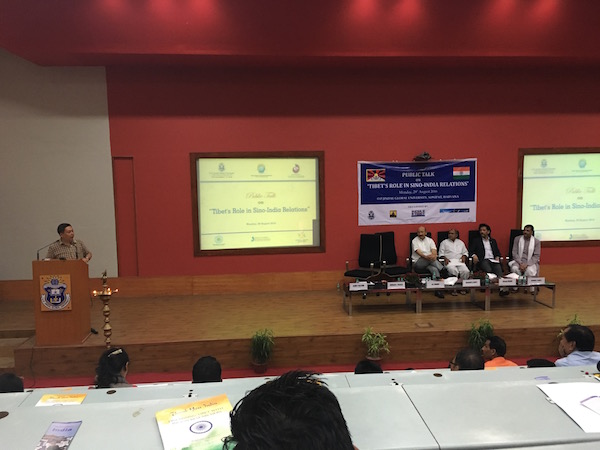
Mr Jigmey Tsultrim, Coordinator of India Tibet Coordination Office, speaking at the public talk on ‘Tibet’s role in Sino-India Relations.’
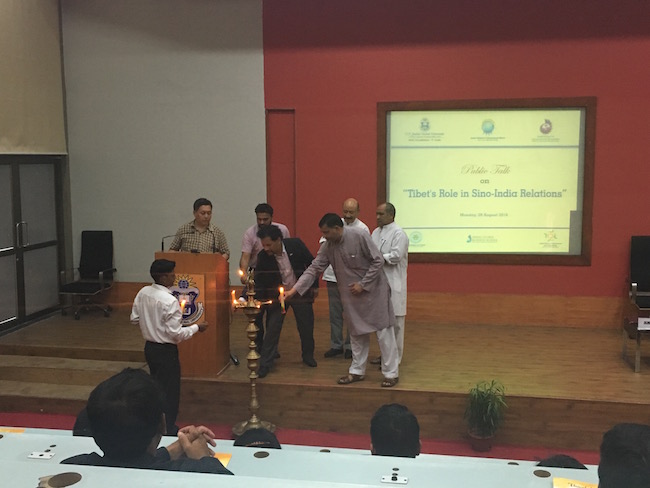
Deputy Director of Tibet Policy Institute along with the distinguished speakers lighting the auspicious butter lamp before the talk.
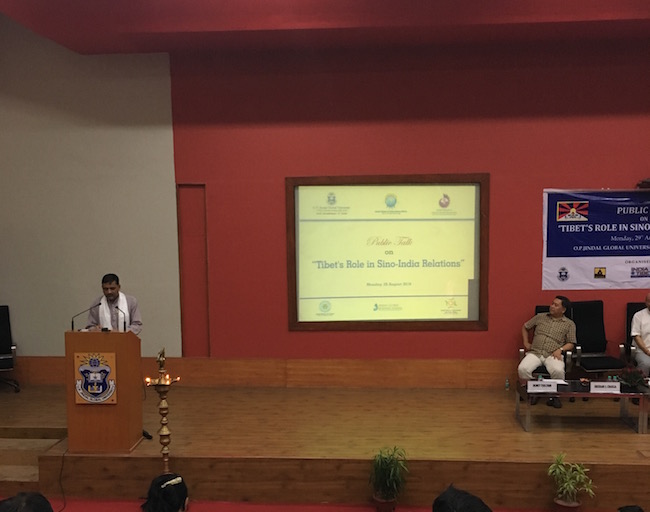
Shri Joginder Singh Dahiya, Chairman, Kharkhoda Block Congress, Sonipat speaking on the significance of India-Tibet relations.

Deputy Director Mr Sonam Tenzing, Tibet Policy Institute presenting a memento to Dr Roger Chi-Feng Liu, Associate Professor, Jindal School of Liberal Arts and Humanities.
